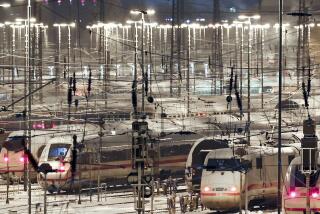Bush Urges Fast Action in Event of Rail Strike
With a coast-to-coast rail strike threatened at midnight, President Bush asked Congress on Tuesday to intervene immediately if there is a major walkout so that damage to the shaky economy can be avoided and hardship to hundreds of thousands of commuters can be minimized.
“Congress will not sit idly by,” promised Rep. John D. Dingell (D-Mich.), chairman of the House Energy and Commerce Committee, which has jurisdiction over the rail industry.
In a similar expression of concern, the Senate went on record, 58 to 39, in favor of prompt action to halt what it characterized as a potentially “devastating” walkout.
While rail labor unions found some sympathy on Capitol Hill for their arguments against government intervention in the dispute, few lawmakers expressed doubt that they would have to act within a day or two to end a major railroad strike.
There was some indication, however, that Congress would conduct hearings today and possibly Thursday before voting on any legislation to halt a strike, rather than acting as quickly as Bush asked.
Although only a fraction of the railroad work force is directly involved in the bargaining, members of other rail unions would refuse to cross picket lines in the event of a strike--thus halting traffic on virtually every line.
Bush said that to be effective Congress will have to pass legislation in less than 24 hours of a strike. It acted with such speed in April, 1991, when striking railroad unions halted train service across the nation.
“It ought to end the day it begins,” the President said, without recommending a solution to the impasse.
In preparation for a strike, Amtrak began shutting down its operations hours in advance of the deadline, while freight shippers who depend on railroads scrambled to make alternate arrangements.
Negotiations continued late Tuesday evening but there was little movement and Transportation Secretary Andrew H. Card Jr. said that he saw no sign of a breakthrough in three separate contract disputes involving five unions.
Key areas of dispute in the talks are wages, job security and working conditions.
“Obviously, we’re going to shut down all the freight in the United States on railroads,” Lloyd Wickersham, general chairman of 12,000 Machinists’ union members on the Union Pacific and Kansas City Southern railroads, told the Associated Press. “A strike is imminent.”
There apparently was little hope for avoiding a strike against Amtrak by the Brotherhood of Maintenance of Way Employees and two other unions involved in bitter negotiations over wages and working conditions.
A separate dispute involved Conrail, a major freight line in the Northeast, while a third set of negotiations covered 40 other freight carriers in all parts of the continental United States.
In each case, Bush had named special emergency boards to investigate the disputes and make recommendations but the unions rejected proposed settlements in all three instances.
Rather than propose his own solution or seek to extend a strike ban scheduled to expire at 12:01 a.m. EDT Wednesday, however, the President told Congress that it should make sure a shutdown does not undermine economic recovery or halt commuter train service.
“Should a strike occur, Congress has an obligation to move fast to protect the American people,” the President said after a briefing on the stalemated talks by Card.
“We’ve simply done everything we can,” said Judy Smith, a White House spokeswoman.
Meantime, Amtrak’s parent company, the National Passenger Rail Corp. announced that it had reached agreement with two smaller unions--the International Brotherhood of Electrical Workers and the American Train Dispatchers Assn. They represent 1,500 and 160 workers, respectively, but the settlements are not likely to influence the major negotiations with larger labor organizations.
Sen. Howard M. Metzenbaum (D-Ohio) was one of the few lawmakers who spoke up for the rail union position during a brief Senate debate on the threat of a strike.
Some of the union members, he said, have been working for four years without pay increases. Maintenance of way employees, who repair track, are being asked to forgo free room and board in railroad dormitory cars and accept instead a $35 daily payment that they say would not be enough to cover the costs of food and shelter in private accommodations.
Sen. Orrin G. Hatch (R-Utah), however, expressed the dominant sentiment when he said: “If we have this strike, it’s going to be crippling to our economy.”
A strike would have its biggest immediate impact on rail commuters in New York, Chicago, Los Angeles and other major cities. Even non-struck carriers would be affected if they used Amtrak-owned terminals in New York and Chicago.
Thousands of commuters nationwide would find their trains canceled outright and hundreds of thousands more would be inconvenienced if the threatened strike shuts down Amtrak operations.
About 3,000 Southern California commuters already have been affected by Amtrak’s preemptive decision to temporarily cancel all services, including the San Diegan intercity trains that operate as an informal commuter service linking San Diego and Orange counties with Los Angeles.
In New York, where about 40% of the country’s commuter train services are concentrated, a walkout would disrupt but not cancel services. Amtrak owns Manhattan’s primary commuter-rail terminal, Pennsylvania Station, and all of the tracks and tunnels leading to it. They have been shut down in anticipation of a strike against Amtrak.
As a result, the nation’s largest commuter line, the Long Island Rail Road, is arranging to deposit its 130,000 passengers at six subway stations in Queens and Brooklyn, said spokeswoman Susan McGowan. Riders can complete their commutes on public transit. Subways are unaffected by the threatened strike.
About 73,000 riders on four of Metropolitan Rail Chicago’s 11 commuter-rail lines also will be deposited short of their usual destination, Chicago’s Union Station, because that facility is owned and run by Amtrak. Spokesman Tom Miller said that riders on those lines will be asked to transfer to elevated subway-style trains or Chicago Transit Authority buses outside of the central city Loop.
Chicago’s seven other commuter rail lines, which carry about 60,000 riders a day, will not be affected by the threatened strike. They arrive at the Chicago Passenger Terminal or at the La Salle Street Station, which are not run by Amtrak.
Four of 12 commuter train lines operated by New Jersey Transit rely on Amtrak-owned tracks and will be shut down, affecting about 45,000 riders who shuttle between northern New Jersey suburbs and New York City, spokesman Armando Arristia said. Charter buses are being marshaled to replace the trains, he said, but they will not be able to handle all displaced riders.
Meanwhile, Amtrak held to its promise to cancel all of its own long-distance and intrastate services in anticipation of a strike, to avoid stranding any of its 60,000 daily riders short of their destinations.
Amtrak stopped accepting reservations and set up special reduced fares on United Air Lines, Delta Air Lines and USAir. Greyhound bus lines offered to honor Amtrak tickets. A lengthy shutdown, of course, would interfere with auto, steel and other manufacturing industries that rely on railroads to deliver supplies and carry away finished products. Railroads carry about 40% of the nation’s freight.
Some of the nation’s key industries rely heavily on the railroads to receive supplies and ship finished goods. Railroads carry more than 50% of the nation’s chemical products, 60% of coal production and about 45% of food company shipments.
In addition, about 67% of auto industry business is conducted by rail. The auto industry uses railroads to move parts to assembly lines and to ship finished vehicles to their destinations, according to railroad officials.
At General Motors Corp., about a quarter of manufacturing and assembly operations would be affected in some way within 24 hours of a rail strike. Within 72 hours, that number would grow to 50%, spokeswoman Toni Simonetti said.
The railroad strike also could disrupt other forms of transportation. United Parcel Service is one of the nation’s largest users of rail lines, said spokesman Bob Kenney. The company, he said, would “incur operational hardships and additional costs” if the strike occurs.
The strike also could cause problems at the nation’s ports. At the Port of Los Angeles, for example, most of the millions of containers that arrive by cargo ship are taken off the dock by rail. The docks and storage yards at the port can become clogged with cargo if rail service is interrupted, said Jeff Leong, a spokesman for the Port of Los Angeles.
Times staff writers Mark A. Stein and Jesus Sanchez in Los Angeles contributed to this story.
More to Read
Get the L.A. Times Politics newsletter
Deeply reported insights into legislation, politics and policy from Sacramento, Washington and beyond. In your inbox three times per week.
You may occasionally receive promotional content from the Los Angeles Times.






